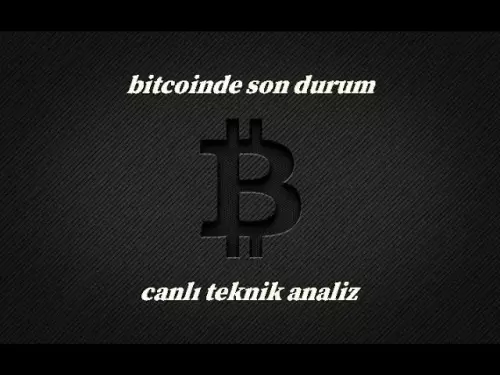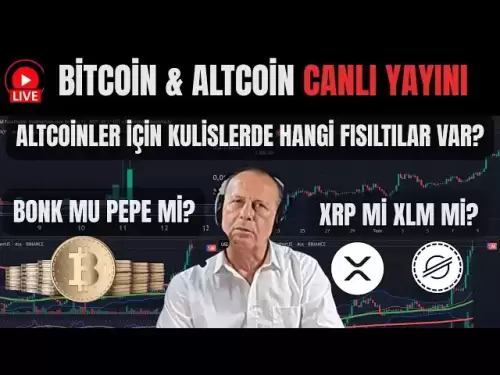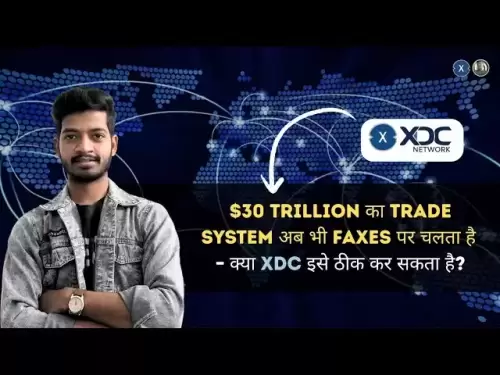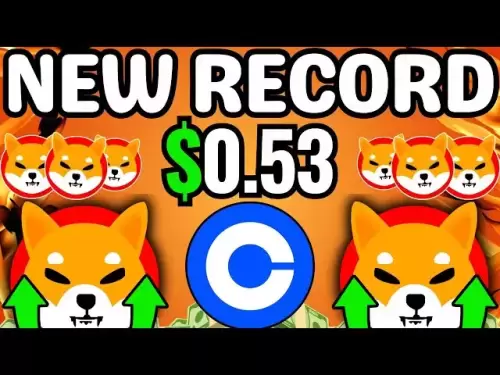-
 Bitcoin
Bitcoin $117,879.8627
0.05% -
 Ethereum
Ethereum $2,956.4450
-0.23% -
 XRP
XRP $2.7737
-0.58% -
 Tether USDt
Tether USDt $1.0003
-0.01% -
 BNB
BNB $687.3817
-0.92% -
 Solana
Solana $161.9370
-0.65% -
 USDC
USDC $1.0000
0.00% -
 Dogecoin
Dogecoin $0.1983
-2.35% -
 TRON
TRON $0.3019
-1.02% -
 Cardano
Cardano $0.7217
-0.53% -
 Hyperliquid
Hyperliquid $47.5630
3.05% -
 Stellar
Stellar $0.4341
11.02% -
 Sui
Sui $3.4115
-0.11% -
 Chainlink
Chainlink $15.1548
-0.82% -
 Bitcoin Cash
Bitcoin Cash $505.9817
-4.61% -
 Avalanche
Avalanche $21.0131
1.73% -
 Hedera
Hedera $0.2033
2.29% -
 UNUS SED LEO
UNUS SED LEO $9.0775
-0.06% -
 Shiba Inu
Shiba Inu $0.0...01315
-1.08% -
 Toncoin
Toncoin $3.0032
0.48% -
 Litecoin
Litecoin $93.1712
-1.23% -
 Polkadot
Polkadot $3.9194
-0.78% -
 Monero
Monero $334.1138
0.50% -
 Dai
Dai $1.0000
-0.01% -
 Ethena USDe
Ethena USDe $1.0005
-0.04% -
 Uniswap
Uniswap $8.4642
-3.24% -
 Pepe
Pepe $0.0...01231
-0.36% -
 Bitget Token
Bitget Token $4.3823
-1.34% -
 Aave
Aave $302.1026
0.83% -
 Bittensor
Bittensor $386.2829
-2.26%
What is the difference between a futures contract and a contract for difference (CFD)?
Futures contracts and CFDs allow traders to speculate on asset prices without owning the underlying asset, but differ in structure, regulation, and risk factors.
Jul 13, 2025 at 03:28 am
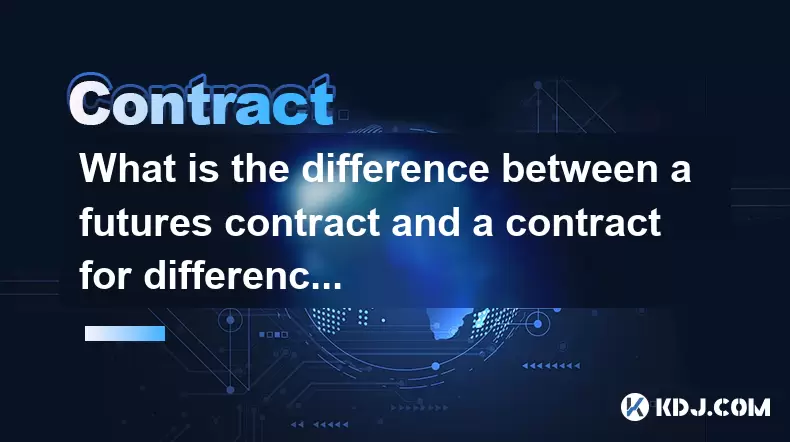
Understanding Futures Contracts
A futures contract is a standardized legal agreement to buy or sell a particular asset at a predetermined price at a specified time in the future. These contracts are traded on regulated exchanges, such as the Chicago Mercantile Exchange (CME). The underlying assets can include commodities, indices, or cryptocurrencies.
One key characteristic of futures contracts is that they have fixed expiration dates and contract sizes. Traders who enter into these contracts are obligated to fulfill the terms unless they close their position before expiration. In the context of cryptocurrency, futures contracts allow traders to speculate on the price movements of digital assets like Bitcoin or Ethereum without owning the actual coins.
Another important feature is margin trading, where traders deposit a percentage of the total contract value as collateral. This enables leveraged trading but also increases risk exposure.
Exploring Contracts for Difference (CFDs)
A contract for difference (CFD) is an agreement between a buyer and a seller to exchange the difference in the value of an asset from the time the contract opens to when it closes. Unlike futures contracts, CFDs are not traded on regulated exchanges but rather through over-the-counter (OTC) brokers.
CFDs provide flexibility in trading various financial instruments including stocks, forex, and cryptocurrencies. One major advantage of CFDs is the ability to trade on margin with high leverage, often higher than what’s available in futures markets. However, this also means increased potential for both gains and losses.
Traders do not take ownership of the underlying asset in a CFD transaction, which makes it more appealing for short-term speculation. CFDs don't have fixed expiration dates, allowing positions to be held open for extended periods, subject to financing costs.
Key Differences Between Futures and CFDs
The most notable distinction lies in how each instrument is structured and traded. Futures contracts are standardized and traded on exchanges, while CFDs are customizable and traded OTC. This affects transparency, pricing mechanisms, and regulatory oversight.
Another critical difference is the presence of fixed expiration dates in futures contracts, whereas CFDs offer indefinite holding periods. This gives CFD traders more flexibility in managing long-term positions.
Settlement methods differ too. Futures contracts may require physical delivery or cash settlement upon expiry, depending on the asset type. In contrast, CFDs are always cash-settled, eliminating the need for physical delivery.
Leverage availability also varies. While both products offer leveraged trading, CFDs typically provide higher leverage ratios compared to futures contracts, increasing both profit potential and risk.
Lastly, regulatory frameworks vary significantly across jurisdictions, with futures being more heavily regulated due to their exchange-traded nature. CFDs face restrictions in some regions, including the United States, where they are not legally offered by domestic brokers.
Operational Aspects: How to Trade Futures and CFDs
To begin trading futures contracts, follow these steps:
- Choose a regulated exchange offering crypto futures.
- Open a brokerage account and complete identity verification.
- Deposit funds and set up a trading platform.
- Select the desired futures contract based on asset, size, and expiration date.
- Place an order using market or limit instructions.
- Monitor open positions and manage risk via stop-loss orders.
- Close the position before expiration or prepare for settlement.
For trading CFDs, proceed as follows:
- Select a licensed broker offering CFD products.
- Create and verify your trading account.
- Fund your account with sufficient capital.
- Access the broker’s trading interface and search for the desired asset.
- Decide on trade size, leverage level, and direction (buy/sell).
- Execute the trade and apply risk management tools like stop-loss and take-profit.
- Adjust or close the position anytime without expiration concerns.
Both instruments require understanding margin requirements, overnight financing charges (especially for CFDs), and execution types.
Risk Management Considerations
Trading either futures or CFDs involves significant risks due to the use of leverage. It's crucial to implement robust risk management strategies regardless of the chosen instrument.
Use stop-loss orders to automatically close losing trades at predefined levels. This helps prevent emotional decision-making and limits potential losses.
Maintain appropriate position sizing relative to account size and risk tolerance. Overleveraging can lead to margin calls and forced liquidation of positions.
For futures traders, pay attention to expiry dates and rollover procedures. Rolling over a position to a new contract requires closing the current one and opening a fresh contract, which may incur additional costs.
In CFD trading, monitor overnight financing fees if holding positions past daily cutoff times. These fees accumulate over time and impact profitability, especially in long-term trades.
Both futures and CFD traders should continuously educate themselves on market dynamics, technical analysis, and fundamental factors influencing asset prices.
Frequently Asked Questions
Q: Can U.S. residents trade CFDs?
A: No, CFDs are not available to U.S. residents due to regulatory restrictions imposed by the SEC and CFTC, which prohibit domestic brokers from offering these instruments.
Q: Are futures contracts only for institutional investors?
A: No, retail investors can also trade futures contracts through online brokers, although they must meet minimum account requirements and understand the associated risks.
Q: Do CFDs have bid-ask spreads like traditional markets?
A: Yes, CFD providers typically charge a spread, which represents the difference between the buy and sell price. Some brokers may offer commission-free trading but widen the spread instead.
Q: Is leverage the same across all futures and CFD platforms?
A: No, leverage ratios vary by broker, asset class, and jurisdiction, with some platforms offering higher leverage for certain cryptocurrencies or commodities. Always check specific terms before trading.
Disclaimer:info@kdj.com
The information provided is not trading advice. kdj.com does not assume any responsibility for any investments made based on the information provided in this article. Cryptocurrencies are highly volatile and it is highly recommended that you invest with caution after thorough research!
If you believe that the content used on this website infringes your copyright, please contact us immediately (info@kdj.com) and we will delete it promptly.
- Bitcoin Rally, Satoshi Nakamoto, and the Richest Elite: A New World Order?
- 2025-07-13 12:30:12
- Mining, BDAG, LTC Outlook: What's Hot and What's Not?
- 2025-07-13 12:30:12
- XRP Price Surges Amid Whale Wallet Accumulation and Token Ecosystem Growth
- 2025-07-13 11:50:12
- Toncoin, UAE Visa, and Institutional Adoption: A Wild Ride in Crypto
- 2025-07-13 11:05:12
- Floki's Bullish Run: Webull Listing and Price Surge - What's Next?
- 2025-07-13 11:05:13
- Curve DAO (CRV): Riding the Yield Wave in DeFi
- 2025-07-13 11:05:14
Related knowledge

Psychology of trading Bitcoin contracts
Jul 13,2025 at 02:50am
Understanding the Emotional Rollercoaster of Bitcoin Futures TradingBitcoin contract trading, especially in the form of futures, introduces a high lev...
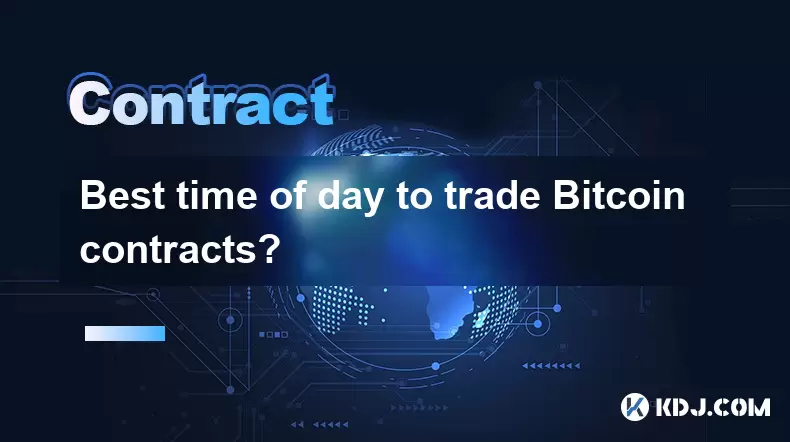
Best time of day to trade Bitcoin contracts?
Jul 13,2025 at 05:29am
Understanding Bitcoin Contracts and Their VolatilityBitcoin contracts, particularly futures contracts, are derivative instruments that allow traders t...
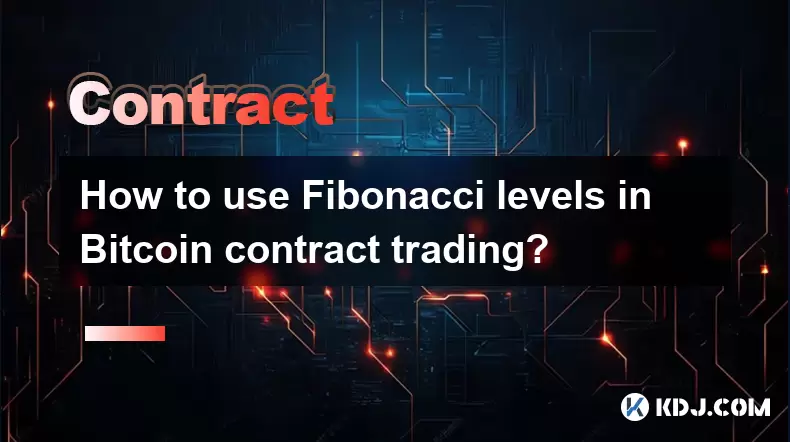
How to use Fibonacci levels in Bitcoin contract trading?
Jul 13,2025 at 08:07am
Understanding Fibonacci Levels in TradingFibonacci levels are a technical analysis tool used by traders to identify potential support and resistance z...

Understanding the Bitcoin futures term structure
Jul 13,2025 at 08:28am
What is Bitcoin Futures Term Structure?The Bitcoin futures term structure refers to the relationship between the prices of Bitcoin futures contracts w...
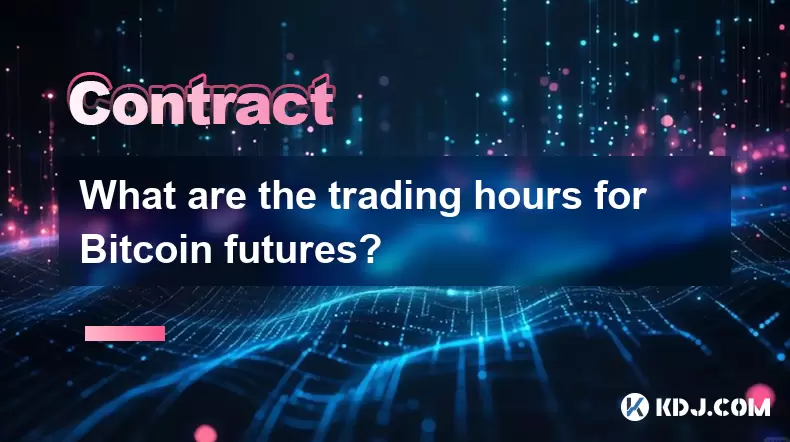
What are the trading hours for Bitcoin futures?
Jul 13,2025 at 12:14pm
Understanding Bitcoin Futures Trading HoursBitcoin futures are derivative contracts that allow traders to speculate on the future price of Bitcoin wit...
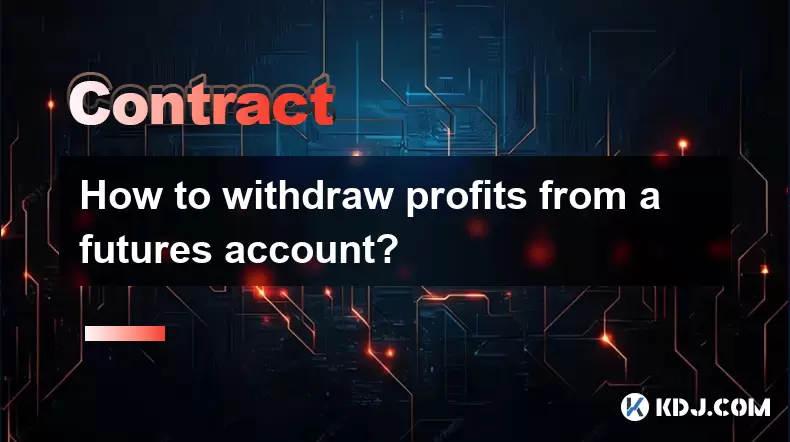
How to withdraw profits from a futures account?
Jul 13,2025 at 07:07am
Understanding Futures Accounts and Withdrawal MechanicsIn the cryptocurrency space, a futures account is used to trade contracts that derive their val...

Psychology of trading Bitcoin contracts
Jul 13,2025 at 02:50am
Understanding the Emotional Rollercoaster of Bitcoin Futures TradingBitcoin contract trading, especially in the form of futures, introduces a high lev...

Best time of day to trade Bitcoin contracts?
Jul 13,2025 at 05:29am
Understanding Bitcoin Contracts and Their VolatilityBitcoin contracts, particularly futures contracts, are derivative instruments that allow traders t...

How to use Fibonacci levels in Bitcoin contract trading?
Jul 13,2025 at 08:07am
Understanding Fibonacci Levels in TradingFibonacci levels are a technical analysis tool used by traders to identify potential support and resistance z...

Understanding the Bitcoin futures term structure
Jul 13,2025 at 08:28am
What is Bitcoin Futures Term Structure?The Bitcoin futures term structure refers to the relationship between the prices of Bitcoin futures contracts w...

What are the trading hours for Bitcoin futures?
Jul 13,2025 at 12:14pm
Understanding Bitcoin Futures Trading HoursBitcoin futures are derivative contracts that allow traders to speculate on the future price of Bitcoin wit...

How to withdraw profits from a futures account?
Jul 13,2025 at 07:07am
Understanding Futures Accounts and Withdrawal MechanicsIn the cryptocurrency space, a futures account is used to trade contracts that derive their val...
See all articles





















